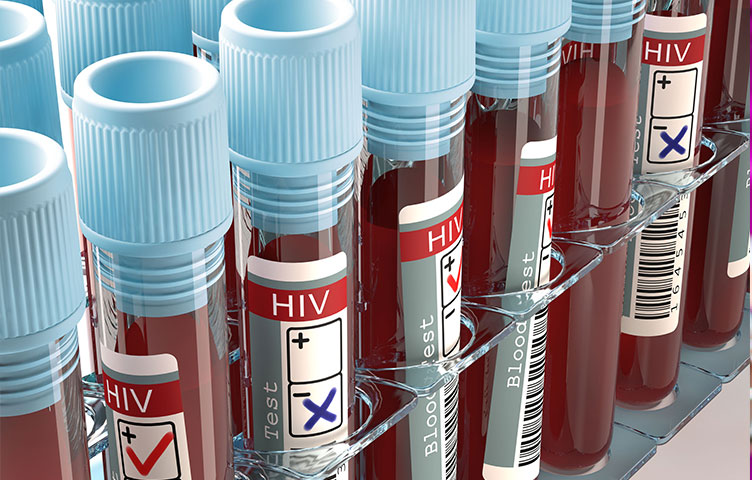HIV & AIDS

Who does HIV disease concern?
HIV, human immunodeficiency virus, can affect everyone in the world and in the TRNC, regardless of religion, language, ethnicity, occupation, age, sexual orientation, woman, man or child. HIV is the disease of our age and everyone should be informed about it. HIV concerns us all.
What is the HIV situation in the world?
HIV / AIDS; there are 37.9 million people living with HIV in the world. Again in 2018, 770 thousand people died with AIDS-related symptoms.
What is HIV (Human Immunodeficiency Virus)?
Failure to receive treatment for an HIV-infected person will result in a weakened and ineffective immune system. The virus settles in the white blood cells, which we call CD4 lymphocytes, and begins to multiply. Over the years, it causes a weakening of the immune system.
What is AIDS (Acquired Immune Deficiency Syndrome)?
It is a set of diseases caused by HIV, which is called “Acquired Immune Deficiency Syndrome” Normally, immunity in a healthy person, that is, the CD4 count is between 600 and 1200. However, the CD4 count of an HIV-positive person who has passed the AIDS stage has dropped below 200. When the CD4 count drops below 200, the person’s immune system is severely weakened and opportunistic infections and cancers can develop much more easily. In short, not every HIV-positive person has AIDS. We can say that AIDS is the advanced final stage of HIV disease.
What is the disease process like after the HIV virus enters the body?
After the virus enters the body, it usually causes flu-like complaints within a month. Therefore, the disease can be easily overlooked in the first stage. Patients are usually sent home with a flu prescription and this period is called “Acute Retroviral Syndrome”. During this period, there may be no signs and symptoms, as well as complaints and findings such as rapid weight loss, dry cough, recurrent fever or night sweats, unexplained fatigue, enlarged armpits, groin or neck lymph nodes.
After this period, the disease enters the silent period, that is, the latent period. In this period, the CD4 count gradually starts to deplete and decrease over the years (2-10 years) without any symptoms or symptoms. As explained above, when the CD4 count drops below 200, the person’s immune system is severely weakened and opportunistic infections and cancers begin to appear.
How is HIV diagnosed?
For the diagnosis of HIV, it is sufficient to have a blood test in any laboratory. HIV testing can be done in all public hospitals in our country. In addition, many private hospitals and laboratories are also tested. Nicosia Dr. It is possible to have a test anonymously at Burhan Nalbantoğlu State Hospital. All you have to do is to apply to an infectious diseases specialist. *Get tested with our sexual health checkup packages (blood and urine samples).
How is the disease transmitted?
The virus can enter the body during unprotected oral, anal and vaginal sexual intercourse. HIV and other sexually transmitted infections can be transmitted through any type of unprotected sexual intercourse.
In addition, it can be transmitted from blood products, use of shared injectors, mother to baby, tattoo or piercing, and accidental injection of the needle into the body (HIV positive person).
In which ways is HIV not transmitted?
HIV is not transmitted through social relationships, kissing, hugging, being in the same environment, using the same cutlery, the same pool, the same toilet, mosquito bites, saliva or sweat unless it contains a visible amount of blood. In short, contrary to what is thought, it is not transmitted by daily social relations.
Who is at risk? Who should get tested first?
In order to reduce the course of HIV disease in society, we need to ensure that undiagnosed patients are diagnosed. First of all, high-risk groups should be determined and people in this group should be tested more often than people in the normal population.
If you are in the risk group, you should definitely get tested without wasting time.
Risk groups;
- Those who have unprotected sex and have multiple partners
- Those with intravenous drug addiction and common injector use
- Those who have a relationship with an HIV-positive person
- People traveling to or living in areas with a high incidence
- Those who have been sexually assaulted
- Those who have homosexual relations between men
I am in the risk group, how can I be protected from HIV disease?
Condom use; HIV transmission through sexual intercourse occurs by contact of sexual fluids with genitals, anus, mouth or open wounds. Using a condom is still the most reliable method of preventing HIV. In our country, condoms are available for both men and women. In all types of sexual intercourse and if used correctly, the risk of transmission approaches 0% (ZERO). It is important to pay attention to the expiry date of the condom, not torn when opening the package and using it.
Uzm. Dr. Emre Y. VUDALI
Infectious Disease Specialist
Please contact our Nicosia or Kyrenia branch to have your test done in Northern Cyprus.